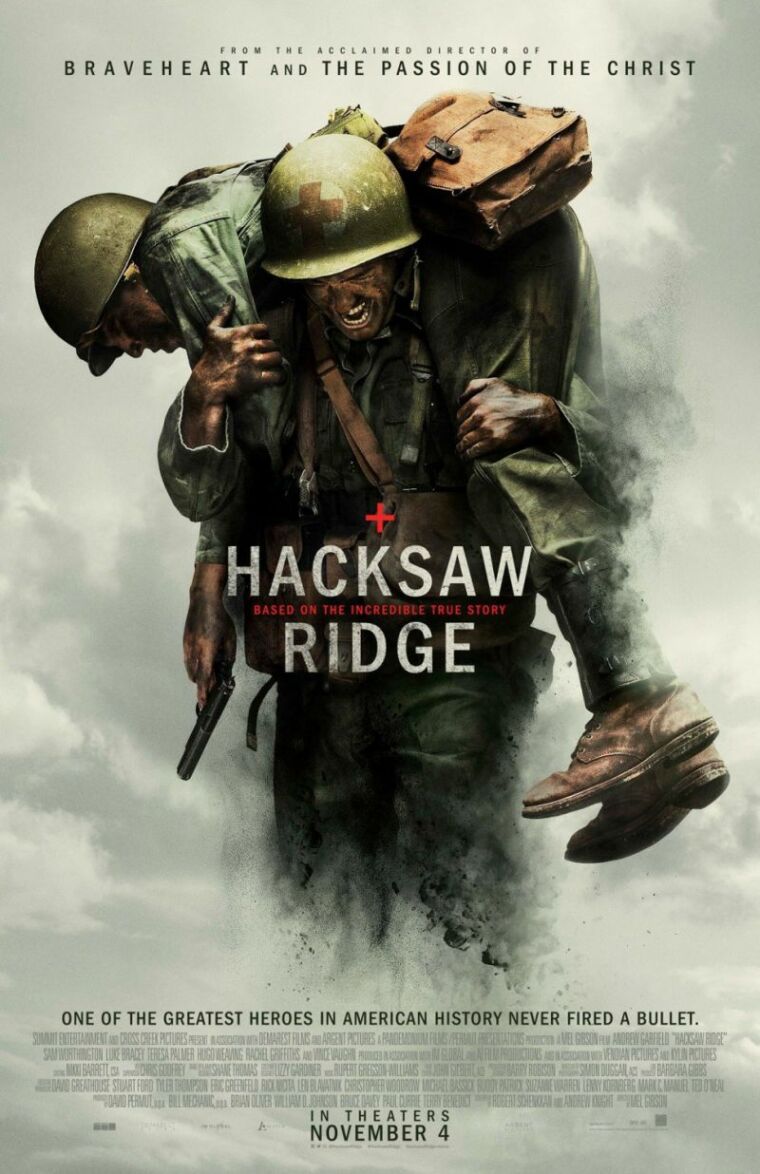'Hacksaw Ridge' hero 'wanted God to get all the glory'

LOS ANGELES (Christian Examiner) – The story of World War II hero Desmond Doss would be nearly unbelievable – if there weren't so many eyewitnesses.
After enlisting as a combat medic and refusing to carry a gun in battle because of his strict Seventh-day Adventist beliefs, Doss found himself in 1945 in one of the war's bloodiest battles: Okinawa in the Pacific theater.
But instead of grabbing a rifle and trying to save himself, Doss put his life on the line and dodged machine gun fire to save 75 wounded soldiers, carrying them one by one out of harm's way. And he survived.
For that and other heroics he received the Medal of Honor, the highest military honor, becoming the first conscientious objector to be recognized with the medal.
His story was the subject of a book (The Unlikeliest Hero) and a documentary (The Conscientious Objector), and on Nov. 3 will be the subject of a movie when Hacksaw Ridge, based on his life, will be released in theaters. It was directed by Mel Gibson, who also directed The Passion of The Christ and Braveheart. Andrew Garfield (The Amazing Spider-Man) plays Doss.
Terry Benedict, a producer of Hacksaw Ridge, told the Christian Examiner that believers everywhere can learn a lot from Doss's story – in the way he refused to compromise his beliefs and in the way he served others. Benedict knew Doss, who died in 2006.
Doss voluntarily enlisted in the war but refused to carry a gun, even though it was required. He thought killing was wrong, although he supported the war's goals.
"He was a man who had a set of beliefs, was convicted of those beliefs, and stood up for those beliefs even though he was being harassed," Benedict told CE. "He also served others and had compassion for others. Desmond very much lived that way, even after the war. He didn't want to be glamorized. He wanted God to get all the glory and the honor, and that is what I promised him would happen with the documentary and the movie."
The Christian Examiner spoke with Benedicts about Doss and the film. Following is a transcript, edited for clarity.
Christian Examiner: Why did Desmond voluntarily enlist if he had these views?
Terry Benedict: As we've heard through history, that was the good war, the justified war. Desmond had a legitimate deferment as a welder at the Navy shipyard of Virginia Beach, but he really felt his calling and giftedness was to be a combat medic. He was very passionate about that, and he wanted to help his fellow brothers in a way that he felt he could best serve them. He wanted to be a combat medic. That was always, from day one, what he wanted to do.
CE: What were his views on pacifism?
Benedict: He was not a pacifist at all. Pacifism, by definition, means that you have no stomach for war and would not participate in in it, at any level. Desmond totally bought into the fact that this war was justified and we needed to do it to protect the freedoms that everybody so cherishes. But he really felt there was a place for him in the military machine as a combat medic. Philosophically, there was no conflict.
CE: When his views became known to those around him, how did people react?
Benedict: His family understood what his motivation was. Some may not have necessarily agreed, but that was the way with lots of families – no one wants to see their son or daughter go off to war and never come back. That's not an easy thing to do. When he joined the military, things began to go sideways pretty quickly, because when he joined, the recruiters at the time said, "Oh, sure, you can be a combat medic." But what they didn't tell him was, "You still have to carry a weapon. And, oh, by the way, you can't tell us you don't want to work on the Sabbath."
CE: How does his story apply to our modern-day world?
Benedict: I think it is so relevant. It is a universal theme that is relevant during any time period but especially today. How often have we seen people really stick up for their beliefs, morally or spiritually?
CE: You knew Desmond. What was he like, personally?
Benedict: He was a what you see is what you get kind of guy. Even though he came from that greatest generation and what is known as maybe a more conservative denomination, he wasn't driven so much by a set of rules as he was by the sort of the ultimate commandment of love, and that's why people didn't understand fully what he was capable of on the battlefield. I had a very grandfatherly relationship with him. He was a tremendous support to me and even to my kids who were very little. My kids were very young – 4 and 6 years old at the time that Desmond passed away, and my kids today are 14 and 16 and they remember him very, very clearly and what he was about. And they remember his demeanor with them. He was a man of few words. He was very humble. But he was that kind of guy that when he said something, you listened. When he said a prayer for you, the prayers were always short, like 30 seconds long, but they cut right to the bone. And they were always very poignant and powerful. You had a great sense of peace being around him. You knew he cared about you.
Hacksaw Ridge is rated R for intense prolonged realistically graphic sequences of war violence including grisly bloody images.